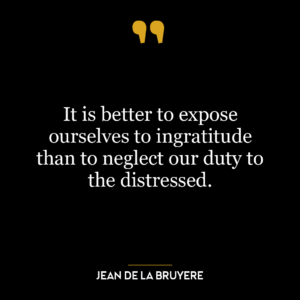Voltaire’s quote, “A historian has many duties… the first is not to slander; the second is not to bore” is a concise summary of the ethical and professional responsibilities that historians, or anyone dealing with the communication of information, should uphold.
The first part, “not to slander,” implies that historians should always strive for accuracy and truthfulness in their work. They should not distort facts or present information in a way that unjustly harms the reputation of individuals or groups. This is a reminder of the power that comes with knowledge and the potential harm that can be done when it is misused.
The second part, “not to bore,” emphasizes the importance of engaging storytelling. Historians, while maintaining their commitment to truth, should also present their findings in a way that captivates their audience. This is crucial in ensuring that history is not just recorded but also read, understood, and appreciated.
Applying this quote to today’s world, it could be seen as a call to all who disseminate information – from journalists to teachers, from authors to social media influencers. In an era of fake news and information overload, the duty not to slander is more important than ever. We must verify our sources and ensure the accuracy of the information we share.
At the same time, with the constant bombardment of content, the duty not to bore is equally critical. We must find innovative and engaging ways to present information to capture the attention of our audience.
In terms of personal development, this quote suggests two key principles. First, honesty and integrity should be at the core of all we do. We should not misrepresent ourselves or others, nor should we engage in slanderous behavior. Second, we should strive to be engaging and interesting in our interactions and communications. This doesn’t mean we need to be entertainers, but it does suggest that we should aim to be engaging and thoughtful in our communication, ensuring our messages are received and understood.










